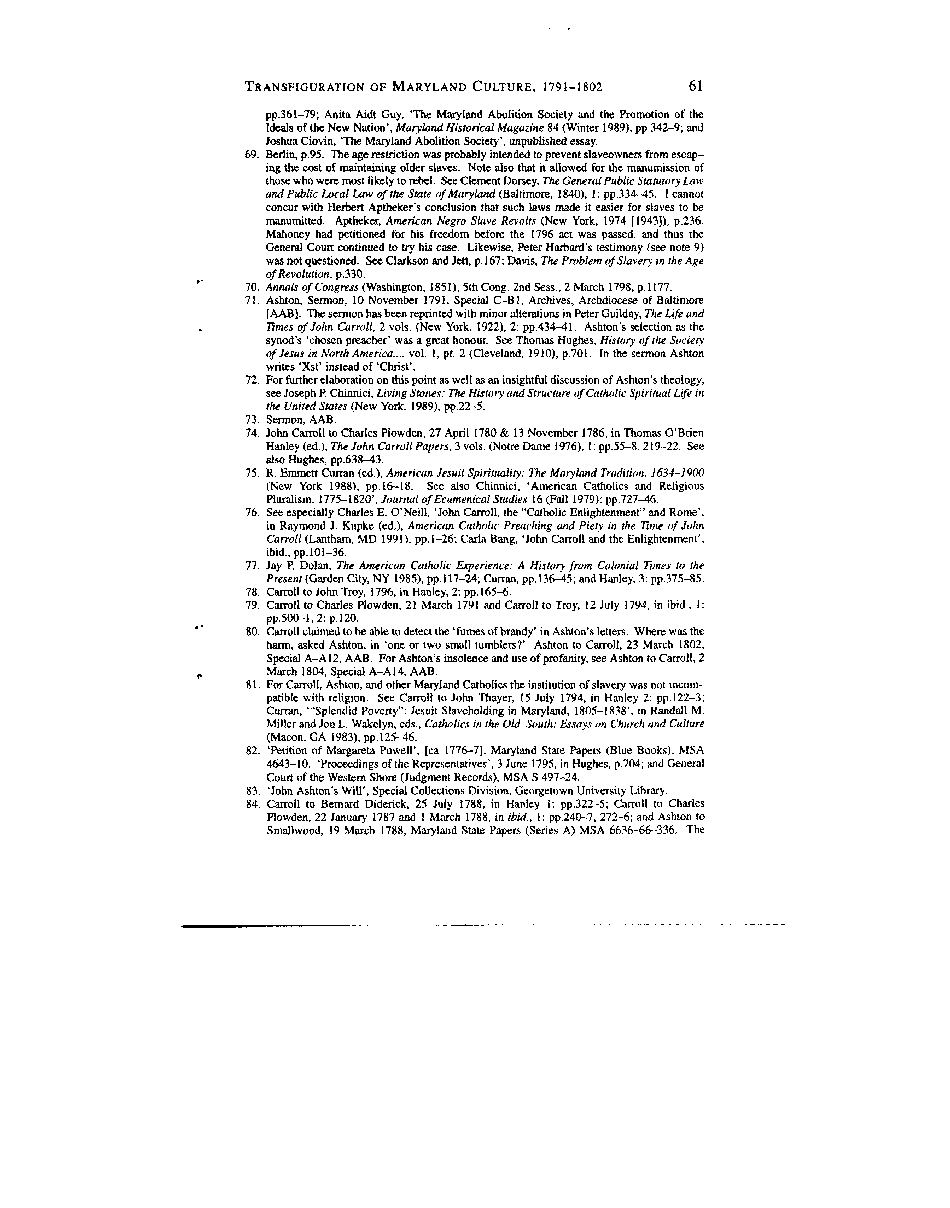|
TRANSFIGURATION OF MARYLAND CULTURE, 1791-1802 61
pp.361-79; Anita Aidt Guy, 'The Maryland Abolition Society and the Promotion of the
Ideals of the New Nation', Maryland Historical Magazine 84 (Winter 1989), pp.342-9; and
Joshua Ciovin, The Maryland Abolition Society', unpublished essay.
69. Berlin, p.95. The age restriction was probably intended to prevent slaveowners from escap-
ing the cost of maintaining older slaves. Note also that it allowed for the manumission of
those who were most likely to rebel. See Clement Dorsey, The General Public Statutory Law
and Public Local Law of the State of Maryland (Baltimore, 1840), 1: pp.334-45. I cannot
concur with Herbert Aptheker's conclusion that such laws made it easier for slaves to be
manumitted. Aptheker, American Negro Stave Revolts (New York, 1974 [1943]), p.236.
Mahoney had petitioned for his freedom before the 1796 act was passed, and thus the
General Court continued to try his case. Likewise, Peter Harbard's testimony (see note 9)
was not questioned. See Clarkson and Jett, p, 167; Davis, The Problem of Slavery in the Age
of Revolution, p.330.
70. Annals of Congress (Washington, 1851), 5th Cong. 2nd Sess., 2 March 1798, p.1177.
71. Ashton, Sermon, 10 November 1791, Special C-B1, Archives, Archdiocese of Baltimore
[AAB]. The sermon has been reprinted with minor alterations in Peter Guilday, The Life and
Times of John Carroll, 2 vols. (New York, 1922), 2: pp.434-41. Ashton's selection as the
synod's 'chosen preacher' was a great honour. See Thomas Hughes, History of the Society
of Jesus in North America..., vol. 1, pt. 2 (Cleveland, 1910), p.701. In the sermon Ashton
writes 'Xst' instead of 'Christ'.
72. For further elaboration on this point as well as an insightful discussion of Ashton's theology,
see Joseph P. Chinnici, Living Stones: The History and Structure of Catholic Spiritual Life in
the United States (New York, 1989), pp.22-5.
73. Sermon, AAB.
74. John Carroll to Charles Plowden, 27 April 1780 & 13 November 1786, in Thomas O'Brien
Hanley(ed.), The John Carroll Papers, 3 vols. (Notre Dame 1976), 1: pp.55-8, 219-22. See
also Hughes, pp.638-^13.
75. R. Emmett Curran (ed.), American Jesuit Spirituality: The Maryland Tradition, J634-1900
(New York 1988), pp. 16-18. See also Chinnici, 'American Catholics and Religious
Pluralism, 1775-1820', Journal of Ecumenical Studies 16 (Fall 1979): pp.727-46.
76. See especially Charles E. O'Neill, 'John Carroll, the "Catholic Enlightenment" and Rome',
in Raymond J. Kupke (ed.), American Catholic Preaching and Piety in the Time of John
Carroll (Lantham, MD 1991), pp.1-26; Carla Bang, 'John Carroll and the Enlightenment',
ibid., pp.101-36.
77. Jay P. Dolan, The American Catholic Experience: A History from Colonial Times to the
Present (Garden City, NY 1985), pp.117-24; Curran, pp.136-45; and Hanley, 3: pp.375-85.
78. Carroll to John Troy, 1796, in Hanley, 2; pp.165-6.
79. Carroll to Charles Plowden, 21 March 1791 and Carroll to Troy, 12 July 1794, in ibid., 1:
pp.500-1,2: p.120.
80. Carroll claimed to be able to detect the 'fumes of brandy' in Ashton's letters. Where was the
harm, asked Ashton, in 'one or two small tumblers?' Ashton to Carroll, 23 March 1802,
Special A-A12, AAB. For Ashton's insolence and use of profanity, see Ashton to Carroll, 2
March 1804, Special A-A14, AAB.
81. For Carroll, Ashton, and other Maryland Catholics the institution of slavery was not incom-
patible with religion. See Carroll to John Thayer, 15 July 1794, in Hanley 2; pp. 122-3;
Curran, '"Splendid Poverty": Jesuit Slaveholding in Maryland, 1805-1838', in Randall M.
Miller and Jon L. Wakelyn, eds., Catholics in the Old South: Essays on Church and Culture
(Macon, GA 1983),pp.l25-46.
82. 'Petition of Margareta Powell', [ca 1776-7], Maryland State Papers (Blue Books), MSA
4643-10. 'Proceedings of the Representatives', 3 June 1795, in Hughes, p.704; and General
Court of the Western Shore (Judgment Records), MSA S 497-24.
83. 'John Ashton's Will', Special Collections Division, Georgetown University Library.
84. Carroll to Bernard Diderick, 25 July 1788, in Hanley 1: pp.322-5; Carroll to Charles
Plowden, 22 January 1787 and 1 March 1788, in ibid., 1: pp.240-7, 272-6; and Ashton to
Smallwood, 19 March 1788, Maryland State Papers (Series A) MSA 6636-66-336. The
�
|

